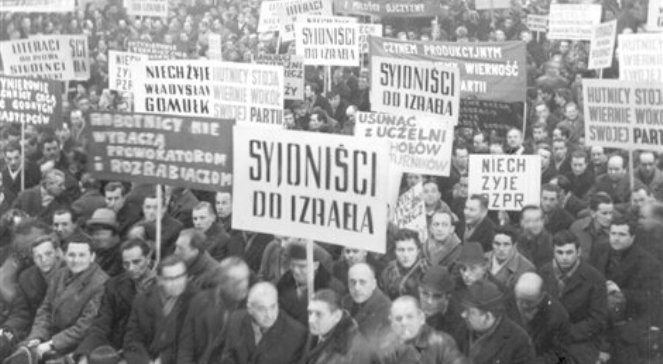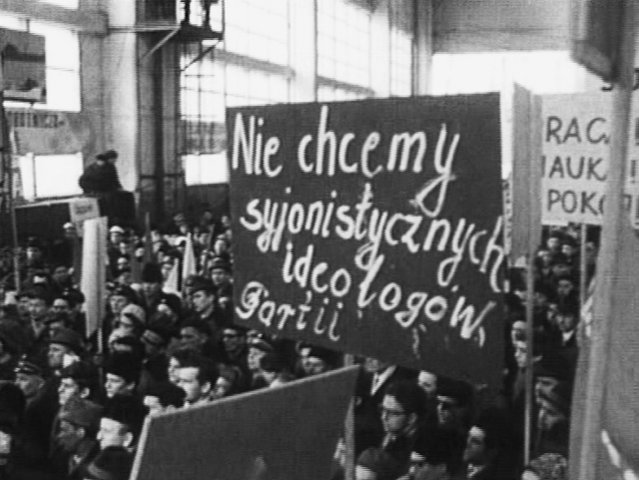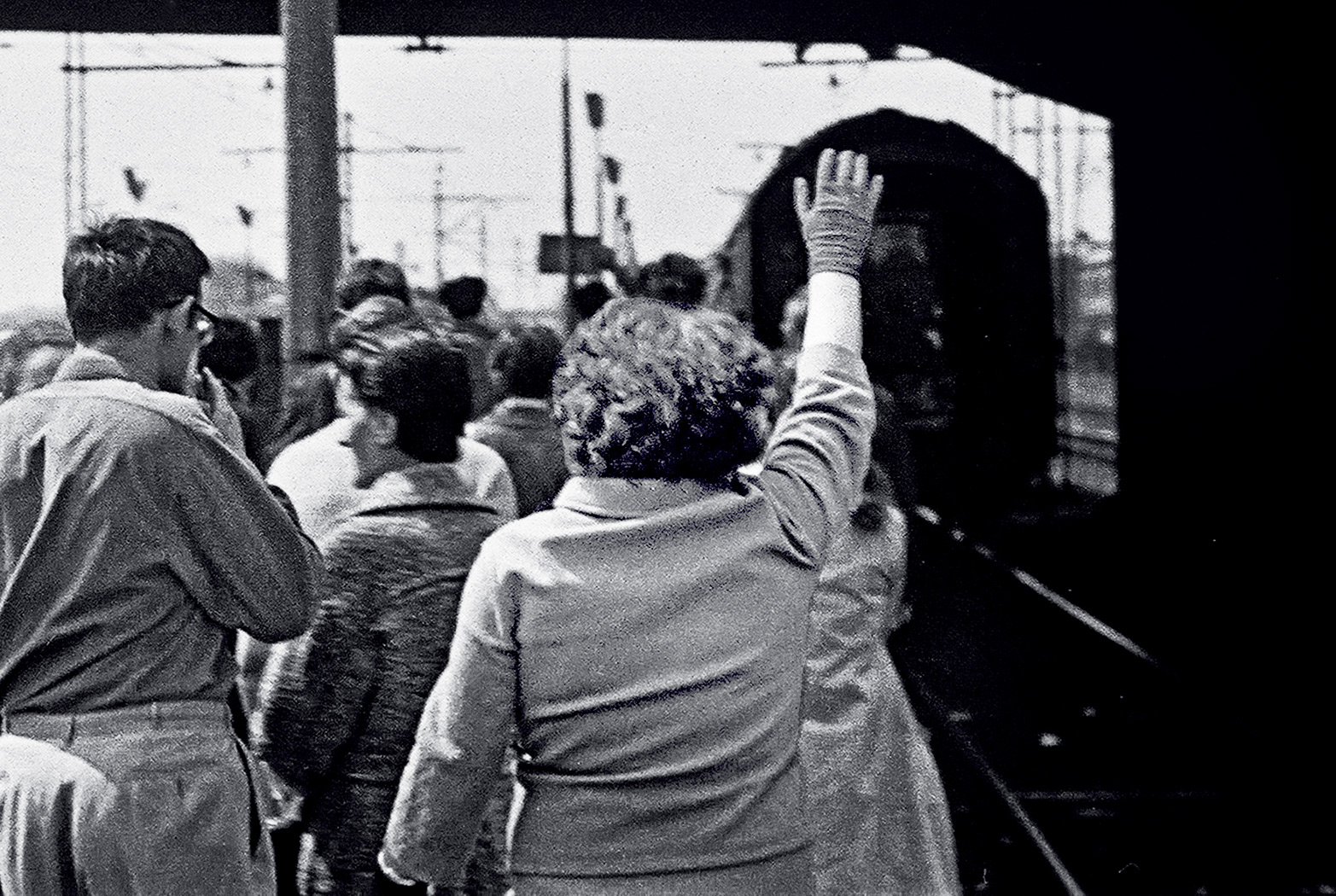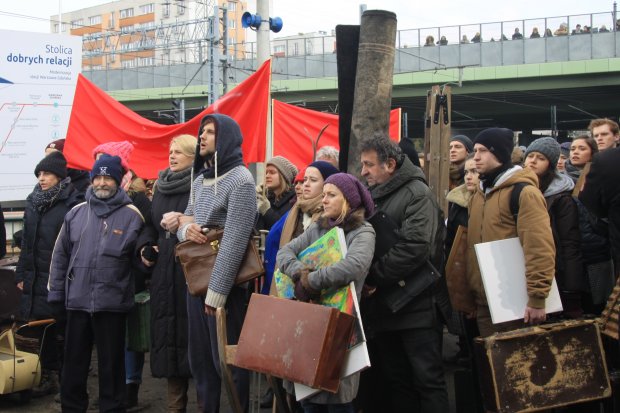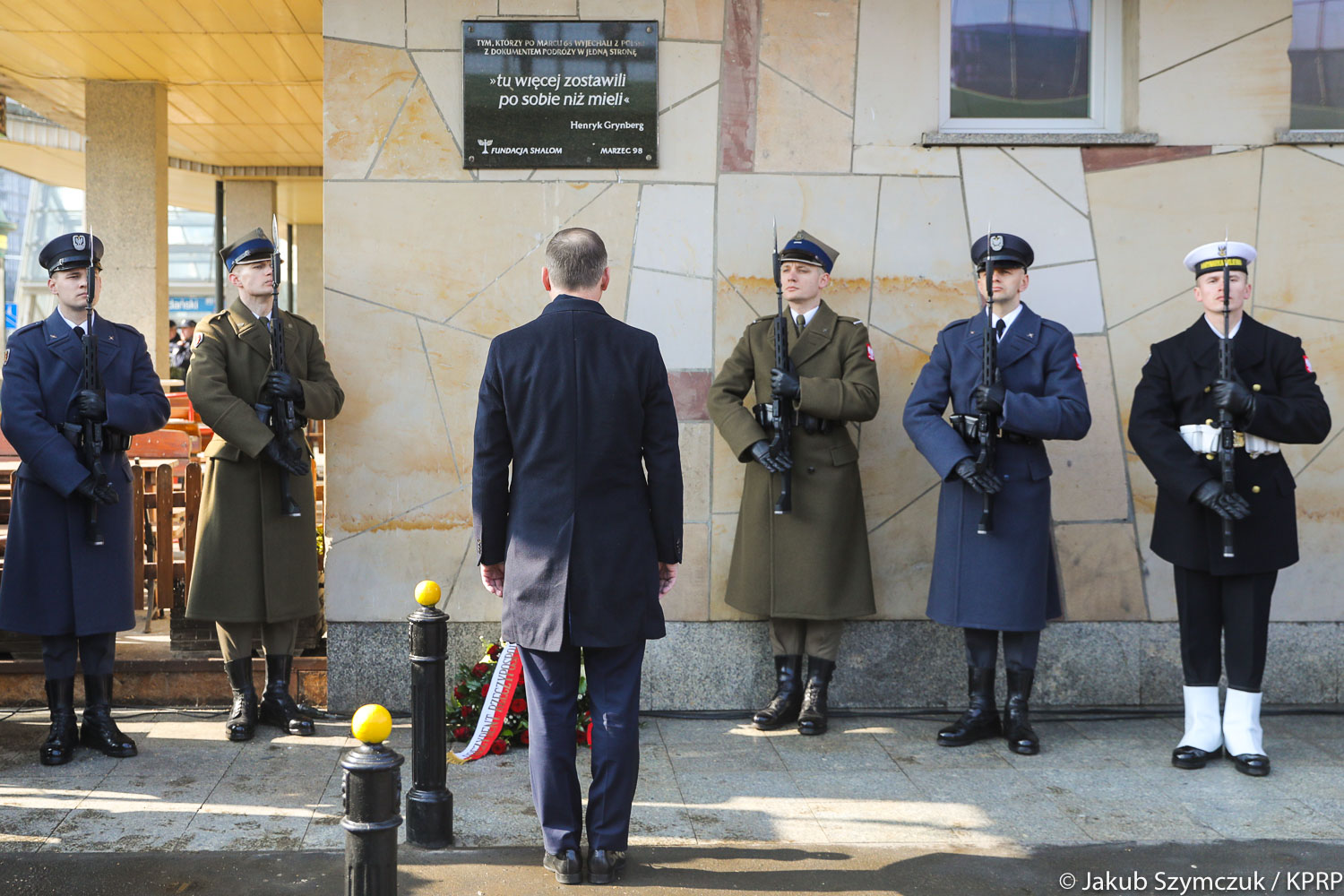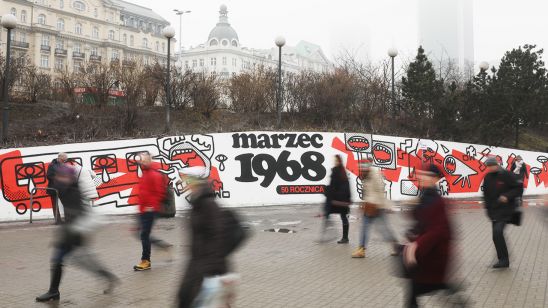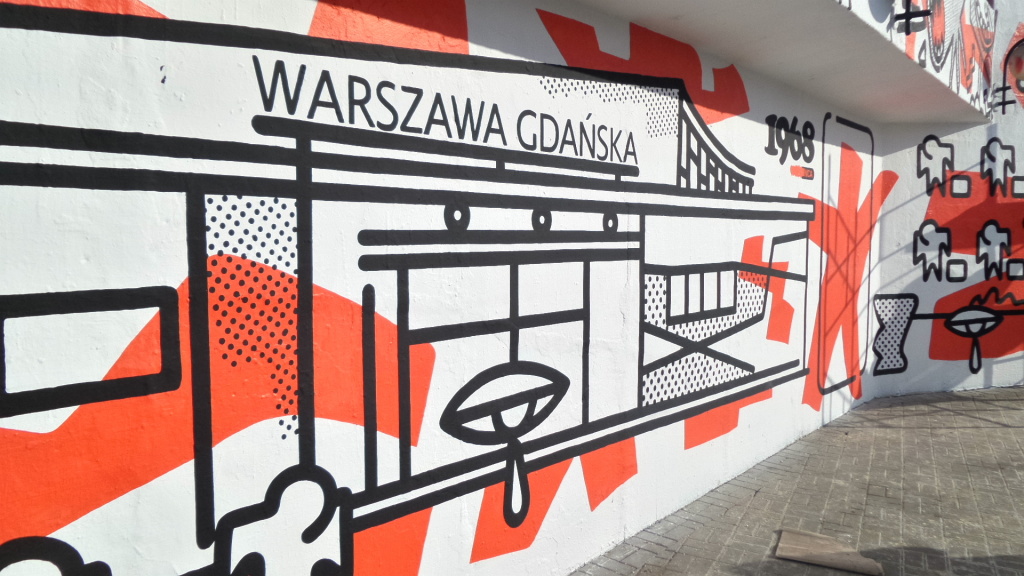Post by Bonobo on Mar 16, 2018 20:08:38 GMT 1
Let`s start with the 50th anniversary of March 1968 events. President Duda, although closely affiliated with right wing PiS ruling party, was able to reject their rhetorics for a while and uttered very important words.
President asks Polish Jews for forgiveness over March 1968
09.03.2018 08:31
The Polish president on Thursday asked for the forgiveness of Polish Jews who suffered as a result of the events of March 1968, though he stressed that those wrongs were carried out by a different Poland than that of today.
Andrzej Duda. Photo: Jakub Szymczuk/KPRPAndrzej Duda. Photo: Jakub Szymczuk/KPRP
Speaking at the University of Warsaw, Duda said: "My generation has no reason to apologise for what happened in March '68 to Polish Jews, who were simply expelled from Poland by the communist authorities... I am asking you to forgive the then-Poland for this hideous act."
But he stressed that current-day Poland was not responsible for an anti-Semitic communist government campaign in 1968 and did not have to ask for forgiveness.
Duda also said that current-day Poland was at a disadvantage, having missed out on the contributions that its Jewish population could have made. He called Jews "the elite of intelligentsia", adding that they were successful and respected in other countries.
Stuggle for independence
Duda also said that the events, which started exactly 50 years ago on Thursday, "were undoubtedly the struggle for independence without censorship".
Duda spoke during official commemorations of the events which started with anti-censorship student protests at the University of Warsaw which extended to other parts of the country and were followed by a government campaign which forced thousands of Jews to leave Poland.
Duda on Thursday also laid a wreath at a plaque commemorating the Polish Jews who left Poland in 1968 and met with people who took part in March 1968 protests and with youths from across Poland.
March 1968
According to an official statement on the president's chancellery's website and the PAP news agency, the March 1968 events included a series of major student and other protests against Poland's then-communist government.
The countrywide demonstrations initially opposed the authorities' decision to ban a patriotic Polish play from being staged at the National Theatre and the expulsion of two Jewish-Polish students from Warsaw University.
The protests were suppressed by security forces. The communist government responded with an anti-Semitic campaign branded as "anti-Zionist," which resulted in the mass emigration of Jews from Poland. (vb/pk)


en.wikipedia.org/wiki/1968_Polish_political_crisis
The Polish 1968 political crisis, also known in Poland as March 1968 or March events (Polish: Marzec 1968; wydarzenia marcowe), pertains to a series of major student, intellectual and other protests against the government of the Polish People's Republic. The crisis resulted in the suppression of student strikes by security forces in all major academic centres across the country and the subsequent repression of the Polish dissident movement. It was also accompanied by mass emigration following an antisemitic (branded "anti-Zionist") campaign waged by the minister of internal affairs, General Mieczysław Moczar, with the approval of First Secretary Władysław Gomułka of the Polish United Workers' Party (PZPR). The protests coincided with the events of the Prague Spring in neighboring Czechoslovakia – raising new hopes of democratic reforms among the intelligentsia. The unrest culminated in the Warsaw Pact invasion of Czechoslovakia on 20 August 1968.[1][2]
The anti-Jewish campaign had already begun in 1967. The policy was carried out in conjunction with the Soviet withdrawal of all diplomatic relations with Israel after the Six-Day War, but also involved a power struggle within the Polish communist party itself. The subsequent purges within the ruling party, led by Mieczysław Moczar and his faction, failed to topple Gomułka's government, but resulted in an exile from Poland of thousands of individuals of Jewish ancestry, including professionals, party officials and secret police functionaries. In carefully staged public displays of support, factory workers across Poland were assembled to publicly denounce Zionism.[3][4] At least 13,000 Poles of Jewish origin emigrated in 1968–72 as a result of being fired from their positions and various other forms of harassment.[5][6][7]
Anti-Jewish mobilization and purges, party politics
General Mieczysław Moczar initiated and led the widespread antisemitic campaign of 1968
In March 1968, the anti-Jewish smear campaign, loud propaganda and mass mobilization were greatly intensified. The process of purging Jewish and other officials, ex-Stalinists, high-ranking rival communists and moral supporters of the current liberal opposition movement, was accelerated.[25] Roman Zambrowski, Stefan Staszewski, Edward Ochab, Adam Rapacki and Marian Spychalski were among the top echelon party leaders removed or neutralized.[3][6] Zambrowski, a Jewish veteran of the Polish communist movement, was singled out and purged from the party first (13 March), even though he had been politically inactive for several years and had nothing to do with the current crisis.[25] Former First Secretary Ochab resigned his several high offices to protest "against the antisemitic campaign".[40] On 11 April 1968, the Sejm instituted changes in some major leadership positions. Spychalski, leaving the Ministry of Defense, replaced Ochab in the more titular role as the chairman of the Council of State. Wojciech Jaruzelski became the new minister of defense. Rapacki, another opponent of antisemitic purges, was replaced by Stefan Jędrychowski at the Ministry of Foreign Affairs. A new higher education statute was designed to give the government greater control over the academic environment.[6]
Gomułka himself considered revisionism rather than "Zionism" to be the main "danger".[40] According to historian Dariusz Stola, the first seccretary, whose wife was Jewish, harbored no antisemitic prejudices.[25][41] But he opportunistically and instrumentally allowed and accepted the anti-Jewish initiative of Minister Moczar and the secret services Moczar controlled. The campaign gave Gomułka the tools he needed to combat the intellectual rebellion, prevent it from spreading into the worker masses (by "mobilizing" them and channeling their frustration against the stealth and alien "enemy"), resolve the party rivalries ultimately to his own advantage and stabilize the situation in Poland at the dangerous for the party time of the Prague Spring liberalizing movement in Czechoslovakia. Many Poles (irrespective of ethnic background) were accused of being Zionists. They were expelled from the party and/or had their careers terminated by policies that were cynical, prejudicial, or both.[3] Long (sometimes conducted over several days) party meetings and discussions took place at the end of March and in early April within various state institutions and enterprises. They dealt with the "Zionism" issue and were devoted to the identification of those responsible and guilty (within the institution's own ranks), their expulsion from the party and demands for their removal from the positions they held.[27]
Attempts were made to steer the attention of the general public away from the student movement and advocacy for social reform, centered around the defense of freedom of speech for intellectuals and artists and the right to criticize the regime and its policies.[30] Moczar, the leader of the hardline Stalinist faction of the party, blamed the student protests on "Zionists" and used the protest activity as a pretext for a larger antisemitic campaign (officially described as "anti-Zionist") and party purges. In reality, the student and intellectual protests were generally not related to Zionism or other Jewish issues.[7] The propagated idea of the "Zionist inspiration" of student rebellion originated in part from the presence of children of Jewish communists among those contesting the political order, including especially members of the Komandosi group. To augment their numbers, figures of speech such as the "Michniks, Szlajfers, Zambrowskis" were used.[25] The national strike call from Warsaw (13 March) opposed both antisemitism and Zionism.[31][42] One banner hung at a Rzeszów high school on 27 April read: "We hail our Zionist comrades."[30]
However, Gomułka warned that "Zionism and antisemitism are two sides of the same nationalist medal" and insisted that communism rejects all forms of nationalism. According to Gomułka, who rejected the Western allegations of antisemitism, "Official circles in the United States have involved themselves in the dirty anti-Polish campaign by making statements accusing Poland of antisemitism. We propose that the ruling circles in the United States check whether American citizens of Polish descent have ever had or have now the same opportunities that Polish citizens of Jewish descent have for good living conditions and education and for occupying positions of responsibility. Then it would emerge clearly who might accuse whom of national discrimination." He went on to say that "the Western Zionist centers that today charge us with antisemitism failed to lift a finger when Hitler's genocide policies exterminated Jews in subjugated Poland, punishing Poles who hid and helped the Jews with death."[43] The party leader was responding to a wave of Western criticism and took advantage of some published reports that were incompatible with the Polish collective memory of historical events, World War II and the Holocaust in particular.[3]
The Moczar challenge, often presented in terms of competing political visions (he was the informal head of the nationalist communist party faction known as "the Partisans"),[3] reflected, according to historian Andrzej Chojnowski, primarily a push for generational change in the party leadership and at other levels, throughout the country. By 1968 Gomułka, whose public relations skills were poor, was unpopular and had lost touch with the population he ruled. Personnel changes, resisted by Gomułka, were generally desired and expected, and in the party General Moczar was the alternative. Large numbers of generally younger functionaries mobilized behind him, motivated by the potential opportunity to advance their stagnant careers. Finding scapegoats (possibly by just claiming that someone was enthusiastic about the Israeli victory) and becoming their replacements meant in 1968 progress in that direction.[27] The Moczar faction's activity was one of the major factors that contributed to the 1968 uproar, but the overdue generational change within the party materialized fully only when Edward Gierek replaced Gomułka in December 1970.[44] Moczar himself campaigned ruthlessly in an ultimately failed attempt to become Gomułka's replacement or successor.[3]
Emigration of Polish citizens of Jewish origin
In a parliamentary speech on 11 April 1968, Prime Minister Cyrankiewicz spelled out the government's official position: "Loyalty to socialist Poland and imperialist Israel is not possible simultaneously. ... Whoever wants to face these consequences in the form of emigration will not encounter any obstacle." The departing had their Polish citizenship revoked.[3]
Historian David Engel of the YIVO Institute wrote: "The Interior Ministry compiled a card index of all Polish citizens of Jewish origin, even those who had been detached from organized Jewish life for generations. Jews were removed from jobs in public service, including from teaching positions in schools and universities. Pressure was placed upon them to leave the country by bureaucratic actions aimed at undermining their sources of livelihood and sometimes even by physical brutality."[45] According to Dariusz Stola of the Polish Academy of Sciences, "the term 'anti-Zionist campaign' is misleading in two ways, since the campaign began as an anti-Israeli policy but quickly turned into an anti-Jewish campaign, and this evident anti-Jewish character remained its distinctive feature".[3] The propaganda equated Jewish origins with Zionist sympathies and thus disloyalty to communist Poland. Antisemitic slogans were used in rallies. Prominent Jews, supposedly of Zionist beliefs, including academics, managers and journalists, lost their jobs. According to the Polish state's Institute of National Remembrance, which investigated events that took place in 1968–69 in Łodź, "in each case the decision of dismissal was preceded by a party resolution about expelling from the party".[18]
Most Polish Jews who claimed their Jewish nationality status at the end of World War II, including Holocaust survivors who registered with the Central Committee of Polish Jews in 1945, had emigrated from postwar Poland already in its first years of existence. According to David Engel's estimates, of the fewer than 281,000 Jews present in Poland at different times before July 1946, only about 90,000 were left in the country by the middle of 1947.[45] Fewer than 80,000 remained by 1951, when the government prohibited emigration to Israel.[46] Additional 30,000 arrived from the Soviet Union in 1957, but almost 50,000, typically people actively expressing the Jewish identity, left Poland in 1957–59, under Gomułka and with his government's encouragement.[45] Approximately 25,000–30,000 Jews lived in Poland by 1967. As a group, they had become increasingly assimilated and secular and had well-developed and functioning Jewish secular institutions.[3] Of the Jews who stayed in Poland, many did so for political and career reasons. Their situation changed after the 1967 Arab–Israeli war and the 1968 Polish academic revolt, when the Jews were used as scapegoats by the warring party factions and pressured to emigrate en masse once more.[45] According to Engel, some 25,000 Jews left Poland during the 1968–70 period, leaving in the country between 5,000 and 10,000 Jews.[45]
From the end of World War II, the Soviet imposed government in Poland, lacking strong popular support, found it expedient to depend disproportionately on Jews for performing clerical and administrative jobs and many Jews rose to high positions within the political and internal security ranks.[45] Consequently, as noted by historian Michael C. Steinlauf – "their group profile ever more closely resembled the mythic Żydokomuna" (see also Jewish Bolshevism).[46][47] For complex historical reasons, Jews held many positions of repressive authority under the post-war Polish communist administrations.[48] In March 1968, some of those officials became the center of an organized campaign to equate Jewish origins with Stalinist sympathies and crimes. The political purges, often ostensibly directed at functionaries of the Stalinist era, affected all Polish Jews regardless of background.[3]
Prior to the 1967–68 events, Polish-Jewish relations had been a taboo subject in communist Poland. Available information was limited to the dissemination of shallow and distorted official versions of historical events, while much of the traditional social antisemitic resentment was brewing under the surface, despite the scarcity of Jewish targets.[3] Popular antisemitism of the post-war years was closely linked to anticommunist and anti-Soviet attitudes and as such was resisted by the authorities.[21] Because of this historically right-wing orientation of Polish antisemitism, the Jews generally felt safe in communist Poland and experienced a "March shock" when many in the ruling regime adopted the antisemitic views of pre-war Polish nationalists to justify an application of aggressive propaganda and psychological terror. The Stalinist in many respects character of the campaign was paradoxically combined with anti-Stalinist and anti-Żydokomuna rhetoric.[49][50] The media "exposed" various past and present Jewish conspiracies directed against socialist Poland, often using prejudicial Jewish stereotypes, which supposedly added up to a grand Jewish anti-Polish scheme. West German-Israeli and American-Zionist anti-Poland blocs were also "revealed". In Poland, it was claimed, the old Jewish Stalinists were secretly preparing their own return to power, to thwart the Polish October gains. The small number of Jews remaining in Poland were subjected to unbearable pressures generated by the state monopolistic media, often dominated by sympathizers of Minister Moczar. Many Jews and non-Jews were smeared and removed by their local Basic Party Organizations (POP), after which they had to be fired from their jobs. Many professionals and non-members of the party fell victims as well.[51]
Most of the last wave (1968–69) of emigrants chose destinations other than Israel, which contradicted the government claim of their pro-Israeli devotion. Disproportionately in Polish society, they represented highly educated, professional and accomplished people.[7] Some communist party activists had previously perceived this factor as an undue "density" of Jews in positions of importance, a remnant of Stalinist times, which resulted in calls for their marginalization and removal from the country.[52]
The Catholic Church and Catholic intelligentsia circles engaged in defense of protesting students, but remained silent on the issue of anti-Jewish campaign and the consequent exodus of Polish Jews.[53][54][55]
Over a thousand former hardline Stalinists of Jewish origin left Poland in and after 1968, among them former prosecutor Helena Wolińska-Brus and judge Stefan Michnik. The Institute of National Remembrance had investigated Stalinist crimes committed by some of the March 1968 emigrants including Michnik, who settled in Sweden, and Wolińska-Brus, who resided in the United Kingdom. Both were accused of being an "accessory to a court murder". Applications were made for their extradition based on the European Arrest Warrants.[56][57]
Between 1961 and 1967, the average rate of Jewish emigration from Poland was 500–900 persons per year.[18] In 1968, a total of 3,900 Jews applied to leave the country. Between January and August 1969, the number of emigrating Jews was almost 7,300, all according to records of the Ministry of Internal Affairs. The security organs maintained comprehensive data on persons with "family background in Israel" or of Jewish origin, including those dismissed from their positions and those who did not hold any official positions but applied for emigration to Israel.[18]
President asks Polish Jews for forgiveness over March 1968
09.03.2018 08:31
The Polish president on Thursday asked for the forgiveness of Polish Jews who suffered as a result of the events of March 1968, though he stressed that those wrongs were carried out by a different Poland than that of today.
Andrzej Duda. Photo: Jakub Szymczuk/KPRPAndrzej Duda. Photo: Jakub Szymczuk/KPRP
Speaking at the University of Warsaw, Duda said: "My generation has no reason to apologise for what happened in March '68 to Polish Jews, who were simply expelled from Poland by the communist authorities... I am asking you to forgive the then-Poland for this hideous act."
But he stressed that current-day Poland was not responsible for an anti-Semitic communist government campaign in 1968 and did not have to ask for forgiveness.
Duda also said that current-day Poland was at a disadvantage, having missed out on the contributions that its Jewish population could have made. He called Jews "the elite of intelligentsia", adding that they were successful and respected in other countries.
Stuggle for independence
Duda also said that the events, which started exactly 50 years ago on Thursday, "were undoubtedly the struggle for independence without censorship".
Duda spoke during official commemorations of the events which started with anti-censorship student protests at the University of Warsaw which extended to other parts of the country and were followed by a government campaign which forced thousands of Jews to leave Poland.
Duda on Thursday also laid a wreath at a plaque commemorating the Polish Jews who left Poland in 1968 and met with people who took part in March 1968 protests and with youths from across Poland.
March 1968
According to an official statement on the president's chancellery's website and the PAP news agency, the March 1968 events included a series of major student and other protests against Poland's then-communist government.
The countrywide demonstrations initially opposed the authorities' decision to ban a patriotic Polish play from being staged at the National Theatre and the expulsion of two Jewish-Polish students from Warsaw University.
The protests were suppressed by security forces. The communist government responded with an anti-Semitic campaign branded as "anti-Zionist," which resulted in the mass emigration of Jews from Poland. (vb/pk)

en.wikipedia.org/wiki/1968_Polish_political_crisis
The Polish 1968 political crisis, also known in Poland as March 1968 or March events (Polish: Marzec 1968; wydarzenia marcowe), pertains to a series of major student, intellectual and other protests against the government of the Polish People's Republic. The crisis resulted in the suppression of student strikes by security forces in all major academic centres across the country and the subsequent repression of the Polish dissident movement. It was also accompanied by mass emigration following an antisemitic (branded "anti-Zionist") campaign waged by the minister of internal affairs, General Mieczysław Moczar, with the approval of First Secretary Władysław Gomułka of the Polish United Workers' Party (PZPR). The protests coincided with the events of the Prague Spring in neighboring Czechoslovakia – raising new hopes of democratic reforms among the intelligentsia. The unrest culminated in the Warsaw Pact invasion of Czechoslovakia on 20 August 1968.[1][2]
The anti-Jewish campaign had already begun in 1967. The policy was carried out in conjunction with the Soviet withdrawal of all diplomatic relations with Israel after the Six-Day War, but also involved a power struggle within the Polish communist party itself. The subsequent purges within the ruling party, led by Mieczysław Moczar and his faction, failed to topple Gomułka's government, but resulted in an exile from Poland of thousands of individuals of Jewish ancestry, including professionals, party officials and secret police functionaries. In carefully staged public displays of support, factory workers across Poland were assembled to publicly denounce Zionism.[3][4] At least 13,000 Poles of Jewish origin emigrated in 1968–72 as a result of being fired from their positions and various other forms of harassment.[5][6][7]
Anti-Jewish mobilization and purges, party politics
General Mieczysław Moczar initiated and led the widespread antisemitic campaign of 1968
In March 1968, the anti-Jewish smear campaign, loud propaganda and mass mobilization were greatly intensified. The process of purging Jewish and other officials, ex-Stalinists, high-ranking rival communists and moral supporters of the current liberal opposition movement, was accelerated.[25] Roman Zambrowski, Stefan Staszewski, Edward Ochab, Adam Rapacki and Marian Spychalski were among the top echelon party leaders removed or neutralized.[3][6] Zambrowski, a Jewish veteran of the Polish communist movement, was singled out and purged from the party first (13 March), even though he had been politically inactive for several years and had nothing to do with the current crisis.[25] Former First Secretary Ochab resigned his several high offices to protest "against the antisemitic campaign".[40] On 11 April 1968, the Sejm instituted changes in some major leadership positions. Spychalski, leaving the Ministry of Defense, replaced Ochab in the more titular role as the chairman of the Council of State. Wojciech Jaruzelski became the new minister of defense. Rapacki, another opponent of antisemitic purges, was replaced by Stefan Jędrychowski at the Ministry of Foreign Affairs. A new higher education statute was designed to give the government greater control over the academic environment.[6]
Gomułka himself considered revisionism rather than "Zionism" to be the main "danger".[40] According to historian Dariusz Stola, the first seccretary, whose wife was Jewish, harbored no antisemitic prejudices.[25][41] But he opportunistically and instrumentally allowed and accepted the anti-Jewish initiative of Minister Moczar and the secret services Moczar controlled. The campaign gave Gomułka the tools he needed to combat the intellectual rebellion, prevent it from spreading into the worker masses (by "mobilizing" them and channeling their frustration against the stealth and alien "enemy"), resolve the party rivalries ultimately to his own advantage and stabilize the situation in Poland at the dangerous for the party time of the Prague Spring liberalizing movement in Czechoslovakia. Many Poles (irrespective of ethnic background) were accused of being Zionists. They were expelled from the party and/or had their careers terminated by policies that were cynical, prejudicial, or both.[3] Long (sometimes conducted over several days) party meetings and discussions took place at the end of March and in early April within various state institutions and enterprises. They dealt with the "Zionism" issue and were devoted to the identification of those responsible and guilty (within the institution's own ranks), their expulsion from the party and demands for their removal from the positions they held.[27]
Attempts were made to steer the attention of the general public away from the student movement and advocacy for social reform, centered around the defense of freedom of speech for intellectuals and artists and the right to criticize the regime and its policies.[30] Moczar, the leader of the hardline Stalinist faction of the party, blamed the student protests on "Zionists" and used the protest activity as a pretext for a larger antisemitic campaign (officially described as "anti-Zionist") and party purges. In reality, the student and intellectual protests were generally not related to Zionism or other Jewish issues.[7] The propagated idea of the "Zionist inspiration" of student rebellion originated in part from the presence of children of Jewish communists among those contesting the political order, including especially members of the Komandosi group. To augment their numbers, figures of speech such as the "Michniks, Szlajfers, Zambrowskis" were used.[25] The national strike call from Warsaw (13 March) opposed both antisemitism and Zionism.[31][42] One banner hung at a Rzeszów high school on 27 April read: "We hail our Zionist comrades."[30]
However, Gomułka warned that "Zionism and antisemitism are two sides of the same nationalist medal" and insisted that communism rejects all forms of nationalism. According to Gomułka, who rejected the Western allegations of antisemitism, "Official circles in the United States have involved themselves in the dirty anti-Polish campaign by making statements accusing Poland of antisemitism. We propose that the ruling circles in the United States check whether American citizens of Polish descent have ever had or have now the same opportunities that Polish citizens of Jewish descent have for good living conditions and education and for occupying positions of responsibility. Then it would emerge clearly who might accuse whom of national discrimination." He went on to say that "the Western Zionist centers that today charge us with antisemitism failed to lift a finger when Hitler's genocide policies exterminated Jews in subjugated Poland, punishing Poles who hid and helped the Jews with death."[43] The party leader was responding to a wave of Western criticism and took advantage of some published reports that were incompatible with the Polish collective memory of historical events, World War II and the Holocaust in particular.[3]
The Moczar challenge, often presented in terms of competing political visions (he was the informal head of the nationalist communist party faction known as "the Partisans"),[3] reflected, according to historian Andrzej Chojnowski, primarily a push for generational change in the party leadership and at other levels, throughout the country. By 1968 Gomułka, whose public relations skills were poor, was unpopular and had lost touch with the population he ruled. Personnel changes, resisted by Gomułka, were generally desired and expected, and in the party General Moczar was the alternative. Large numbers of generally younger functionaries mobilized behind him, motivated by the potential opportunity to advance their stagnant careers. Finding scapegoats (possibly by just claiming that someone was enthusiastic about the Israeli victory) and becoming their replacements meant in 1968 progress in that direction.[27] The Moczar faction's activity was one of the major factors that contributed to the 1968 uproar, but the overdue generational change within the party materialized fully only when Edward Gierek replaced Gomułka in December 1970.[44] Moczar himself campaigned ruthlessly in an ultimately failed attempt to become Gomułka's replacement or successor.[3]
Emigration of Polish citizens of Jewish origin
In a parliamentary speech on 11 April 1968, Prime Minister Cyrankiewicz spelled out the government's official position: "Loyalty to socialist Poland and imperialist Israel is not possible simultaneously. ... Whoever wants to face these consequences in the form of emigration will not encounter any obstacle." The departing had their Polish citizenship revoked.[3]
Historian David Engel of the YIVO Institute wrote: "The Interior Ministry compiled a card index of all Polish citizens of Jewish origin, even those who had been detached from organized Jewish life for generations. Jews were removed from jobs in public service, including from teaching positions in schools and universities. Pressure was placed upon them to leave the country by bureaucratic actions aimed at undermining their sources of livelihood and sometimes even by physical brutality."[45] According to Dariusz Stola of the Polish Academy of Sciences, "the term 'anti-Zionist campaign' is misleading in two ways, since the campaign began as an anti-Israeli policy but quickly turned into an anti-Jewish campaign, and this evident anti-Jewish character remained its distinctive feature".[3] The propaganda equated Jewish origins with Zionist sympathies and thus disloyalty to communist Poland. Antisemitic slogans were used in rallies. Prominent Jews, supposedly of Zionist beliefs, including academics, managers and journalists, lost their jobs. According to the Polish state's Institute of National Remembrance, which investigated events that took place in 1968–69 in Łodź, "in each case the decision of dismissal was preceded by a party resolution about expelling from the party".[18]
Most Polish Jews who claimed their Jewish nationality status at the end of World War II, including Holocaust survivors who registered with the Central Committee of Polish Jews in 1945, had emigrated from postwar Poland already in its first years of existence. According to David Engel's estimates, of the fewer than 281,000 Jews present in Poland at different times before July 1946, only about 90,000 were left in the country by the middle of 1947.[45] Fewer than 80,000 remained by 1951, when the government prohibited emigration to Israel.[46] Additional 30,000 arrived from the Soviet Union in 1957, but almost 50,000, typically people actively expressing the Jewish identity, left Poland in 1957–59, under Gomułka and with his government's encouragement.[45] Approximately 25,000–30,000 Jews lived in Poland by 1967. As a group, they had become increasingly assimilated and secular and had well-developed and functioning Jewish secular institutions.[3] Of the Jews who stayed in Poland, many did so for political and career reasons. Their situation changed after the 1967 Arab–Israeli war and the 1968 Polish academic revolt, when the Jews were used as scapegoats by the warring party factions and pressured to emigrate en masse once more.[45] According to Engel, some 25,000 Jews left Poland during the 1968–70 period, leaving in the country between 5,000 and 10,000 Jews.[45]
From the end of World War II, the Soviet imposed government in Poland, lacking strong popular support, found it expedient to depend disproportionately on Jews for performing clerical and administrative jobs and many Jews rose to high positions within the political and internal security ranks.[45] Consequently, as noted by historian Michael C. Steinlauf – "their group profile ever more closely resembled the mythic Żydokomuna" (see also Jewish Bolshevism).[46][47] For complex historical reasons, Jews held many positions of repressive authority under the post-war Polish communist administrations.[48] In March 1968, some of those officials became the center of an organized campaign to equate Jewish origins with Stalinist sympathies and crimes. The political purges, often ostensibly directed at functionaries of the Stalinist era, affected all Polish Jews regardless of background.[3]
Prior to the 1967–68 events, Polish-Jewish relations had been a taboo subject in communist Poland. Available information was limited to the dissemination of shallow and distorted official versions of historical events, while much of the traditional social antisemitic resentment was brewing under the surface, despite the scarcity of Jewish targets.[3] Popular antisemitism of the post-war years was closely linked to anticommunist and anti-Soviet attitudes and as such was resisted by the authorities.[21] Because of this historically right-wing orientation of Polish antisemitism, the Jews generally felt safe in communist Poland and experienced a "March shock" when many in the ruling regime adopted the antisemitic views of pre-war Polish nationalists to justify an application of aggressive propaganda and psychological terror. The Stalinist in many respects character of the campaign was paradoxically combined with anti-Stalinist and anti-Żydokomuna rhetoric.[49][50] The media "exposed" various past and present Jewish conspiracies directed against socialist Poland, often using prejudicial Jewish stereotypes, which supposedly added up to a grand Jewish anti-Polish scheme. West German-Israeli and American-Zionist anti-Poland blocs were also "revealed". In Poland, it was claimed, the old Jewish Stalinists were secretly preparing their own return to power, to thwart the Polish October gains. The small number of Jews remaining in Poland were subjected to unbearable pressures generated by the state monopolistic media, often dominated by sympathizers of Minister Moczar. Many Jews and non-Jews were smeared and removed by their local Basic Party Organizations (POP), after which they had to be fired from their jobs. Many professionals and non-members of the party fell victims as well.[51]
Most of the last wave (1968–69) of emigrants chose destinations other than Israel, which contradicted the government claim of their pro-Israeli devotion. Disproportionately in Polish society, they represented highly educated, professional and accomplished people.[7] Some communist party activists had previously perceived this factor as an undue "density" of Jews in positions of importance, a remnant of Stalinist times, which resulted in calls for their marginalization and removal from the country.[52]
The Catholic Church and Catholic intelligentsia circles engaged in defense of protesting students, but remained silent on the issue of anti-Jewish campaign and the consequent exodus of Polish Jews.[53][54][55]
Over a thousand former hardline Stalinists of Jewish origin left Poland in and after 1968, among them former prosecutor Helena Wolińska-Brus and judge Stefan Michnik. The Institute of National Remembrance had investigated Stalinist crimes committed by some of the March 1968 emigrants including Michnik, who settled in Sweden, and Wolińska-Brus, who resided in the United Kingdom. Both were accused of being an "accessory to a court murder". Applications were made for their extradition based on the European Arrest Warrants.[56][57]
Between 1961 and 1967, the average rate of Jewish emigration from Poland was 500–900 persons per year.[18] In 1968, a total of 3,900 Jews applied to leave the country. Between January and August 1969, the number of emigrating Jews was almost 7,300, all according to records of the Ministry of Internal Affairs. The security organs maintained comprehensive data on persons with "family background in Israel" or of Jewish origin, including those dismissed from their positions and those who did not hold any official positions but applied for emigration to Israel.[18]








